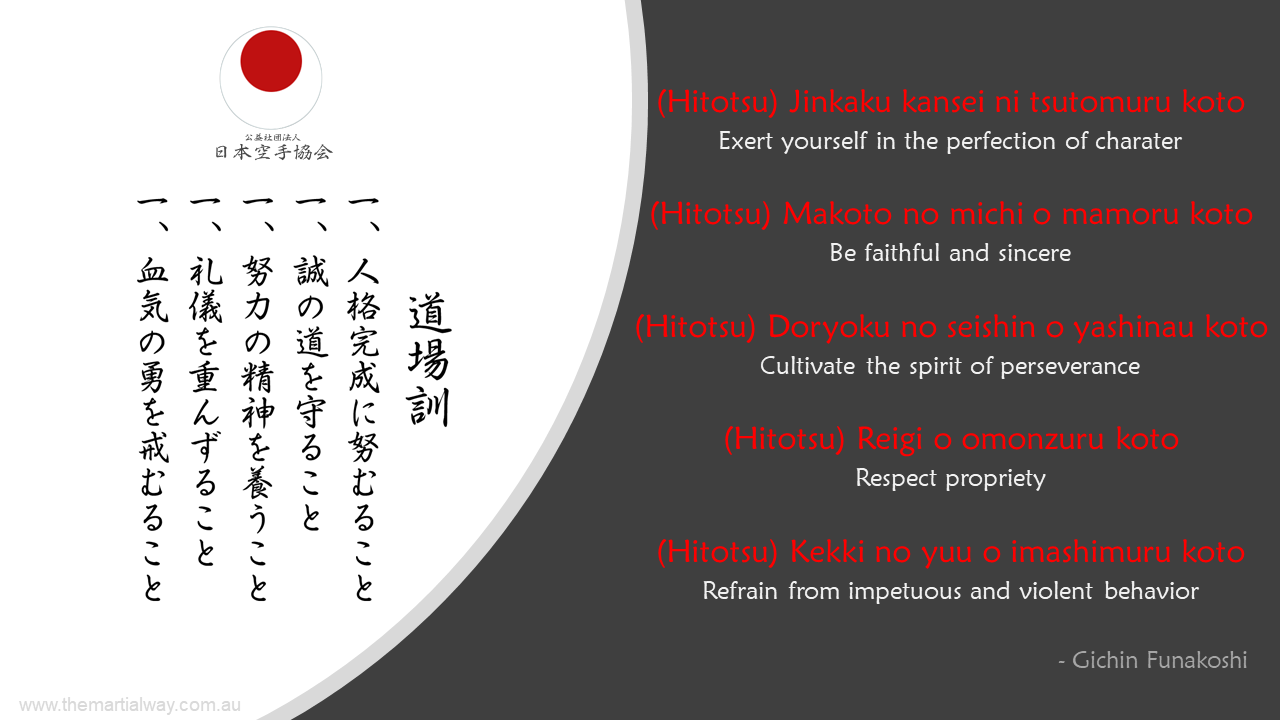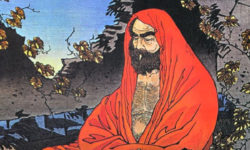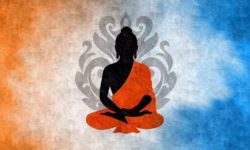Translating the Dojo-kun
The Dojo-kun is a very important part of understanding what karate is all about and it is also one of the things that sets karate apart from many other disciplines. Karate is not a sport, it is a way of life that follows the principles described in the Dojo-kun.
Dojo-kun is a Japanese martial arts term literally meaning (training hall) rules. They are generally posted at the entrance to a dōjō or at the "front" of the dojo (shomen) and outline behaviour expected and disallowed. In some styles of martial arts they are recited at the end of a class.
一、人格 完成に 努める こと
hitotsu, jinkaku kansei ni tsutomeru koto
Exert yourself in the perfection of character
一、誠の道を守ること
hitotsu, makoto no michi o mamoru koto
Be faithful and sincere
一、努力の精神を養うこと
hitotsu, doryoku no seishin o yashinau koto
Cultivate the spirit of perseverance
一、礼儀を重んずること
hitotsu, reigi o omonzuru koto
Respect propriety
一、血気の勇を戒むること
hitotsu, kekki no yū o imashimuru koto
Refrain from impetuous and violent behaviour
Press Play below to listen Hiroyoshi Okazaki Sensei recite the Dojo-kun in Japanese
Translating the Dojo-kun from the Japanese version so that it can be understood by individuals all over the world in their own language is by no means a simple feat. This is because in the Dojo-kun, there are multiple cultural-based implications that are difficult to translate effectively into a language that does not have anything similar to the cultural aspects of Japan. If one takes a look through a Japanese dictionary, one can immediately notice that many words have multiple English synonyms attached to them in an attempt to capture the true meaning given to the word by the Japanese. The Dojo-kun is no different since it is layered with an incredible depth of meaning in just a few words.
Over the years, people have tried to shorten the Dojo-kun for practical purposes, however this often leads to people not really understanding what is meant by the Dojo-kun while losing out on the original Japanese meanings embedded in it.
All the Dojo-kun’s phrases begin with the Japanese word for “one”, which is “hitotsu”. This is generally understood to signify that each one of the five phrases are equally important, that is why they are all “first”.
Below is the first part of the Dojo-kun:
一、人格 完成に 努める こと
hitotsu, jinkaku kansei ni tsutomeru koto
The first word is “jinkaku” whose dictionary definition is found below. As one can see, it carries the meaning/implications of three different words in the English language. Jinkaku refers to the personality and character one has, but it also means the individuality. It emphasizes the idea of the karateka as an individual with his or her personality and character furthering the notion that karate is indeed for everyone, no matter what kind of personality they hold or of their character. It is also emphasizing the fact that it is the individual who should work on what the rest of the sentence proposes.
The next word is “kansei” which as can be seen below holds the meanings of “completion”, “perfection” and “accomplishment” while the third keyword is “tsutomeru” which has even more meanings as can be seen below. The simplified version of this part of the Dojo-kun is often repeated as “Seek perfection of character”. When looking at the meanings of the Japanese words below, it becomes obvious that the shortened English version misses out on a large part of what this phrase is meant to convey.
In English, the word “seek” means to look for, but the Japanese equivalent is in reality “endeavour” – work hard for, “strive” – work hard for against all odds, “make an effort”, “exert oneself” and “be diligent” – keep on trying no matter what with the same passion. All of these multi-layered meaning are lost in the relatively mild use of “seek”. The Dojo-kun does not tell us to simply “seek” perfection of character, as though we are looking for something which we might or might not find along the way, it tells us to strive, work hard for, sweat, endeavour and try again a million times with the same passion until we achieve perfection and completion of our character. It tells us to go on a never-ending journey in search of perfection as we build up, little by little a better character by improving on our individual abilities while never giving up on attaining what might seem out of reach – perfection.
| 人格 | じんかく | personality; character; individuality |
| 完成 | かんせい | 1: complete; completion; 2: perfection; accomplishment |
| 努める | つとめる | to endeavor (endeavour); to try; to strive; to make an effort; to exert oneself; to be diligent |
Next is the second part of the Dojo-kun:
一、誠の道を守ること
hitotsu, makoto no michi wo mamoru koto
The second part of the Dojo-kun is translated in English as “Be sincere” while the Japanese translation should be closer to “Protect the way of truth, sincerity, honesty, integrity and fidelity”. Limiting all the adjectives listed below under the word “makoto” to simply “sincerity” is once again applying a very filtered lens to the outlook presented by the Dojo-kun. The word “mamoru” in Japanese does not mean to simply “be”; “mamoru” is a verb used to mean “protect”, “guard” and “defend” but also “abide by”, “obey”, “follow” and “observe”. In following the Dojo-kun, one cannot limit themselves to simply being sincere. Once again the words in the Dojo-kun imply an ongoing struggle in which the karateka is expected to work hard in order to protect and follow the “correct path”. Guarding and defending the correct path gives much more depth than simply following such a path, it also means that one is expected to stick up for the “correct path” and not passively follow it by him or herself. This also shows that the good karateka must actively help other to find and follow the “correct path”, not simply mind his own business and let others go down the wrong path. The spirit of karate is about helping each other to improve together, not selfishly work for one’s own interests without caring for the welfare of those around him/her too.
The “correct path” which karateka should follow includes being sincere, but it also includes being honest, adhering to moral and ethical principles and being loyal and faithful while strictly observing one’s promises and duties. All these meanings can never be summed up in just “sincerity” because they are so much, much more.
| 誠 | まこと | 1: truth; reality; 2: sincerity; honesty; integrity; fidelity; 3: (Archaism) that’s right (used when recalling forgotten information, suddenly changing the subject, etc.) |
| 道 | みち | 1: road; street; way; path; course; route; lane; 2: distance; ways (e.g. “a long ways”); 3: the way (of proper conduct, etc.); one’s way; morals; 4: teachings (esp. Confucian or Buddhist); dogma; 5: field (of medicine, etc.); subject; |
| 守る | まもる | 1: to protect; to guard; to defend; 2: to keep (i.e. a promise); to abide (by the rules); to observe; to obey; to follow |
The third part of the Dojo-kun:
一、努力の精神を養うこと
hitotsu, doryoku no seishin wo yashinau koto
The third part of the Dojo-kun is translated as “put maximum effort in everything you do”. Once again as can be seen from the individual Japanese meanings below, some of the meaning is once again lost in translation. The Dojo-kun tells us to “With great effort cultivate and maintain the mind, soul, heart, spirit and your intention”. The karateka must not just persevere in everything he or she does, but he or she must also exert to their utmost ability their intent to continue doing so. The effort must not only be put into what you do, but also in your intentions when you do it. The karateka must also “cultivate” within himself/herself the spirit of this perseverance so that it will help perfect their character while instilling the effort exerted as a part of their lives. The effort put into everything must also be put into making this principle an integral part of one’s daily life.
| 努力 | どりょく | great effort; exertion; endeavour; endeavor; effort |
| 精神 | せいしん | mind; soul; heart; spirit; intention |
| 養う | やしなう | to rear; to maintain; to support (e.g. family); to cultivate |
Next is the fourth part of the Dojo-kun:
一、礼儀を重んずること
hitotsu, reigi wo omonzuru koto
The fourth part of the Dojo-kun is translated in English as “respect others”. As can be seen below, the Japanese word “omonzuru” goes far beyond simply respect. It also includes esteem, honour and the idea of holding dear the “reigi”. The Japanese meaning for “reigi” is completely different to the loose English translation of “others”. “Reigi” means manners, courtesy and etiquette. The karateka must not only respect “others”. What about the Dojo itself? Proper courtesy and etiquette require the karateka to respect the Dojo as the place where one learns and trains hard with others. The Japanese version does not limit itself to respecting people, but it broadens the courtesy a karateka is expected to show to everything, not just other human beings. The meaning “esteem” associated with the word “omonzuru” is also of vital importance. The karateka must not only show respect, but he or she must also deeply appreciate everything around them, including intangible things, (like for example, time, which other karateka dedicate to help out in the Dojo). This too is part of the meaning behind what is loosely defined in English as “respect others”.
| 礼儀 | れいぎ | manners; courtesy; etiquette |
| 重んずる | おもんずる | to honor; to honour; to respect; to esteem; to prize |
And finally, the fifth piece of the Dojo-kun:
一、血気の勇を戒むること
hitotsu, kekki no yū wo imashimuru koto
The English translation for the last part of the Dojo-kun is “develop self-control”. When compared to the Japanese version it also seems slightly bland and much less effective. In fact the Japanese words are much harsher. Using the definitions presented below, a direct translation would produce “It is prohibited/forbidden to give in to the ardour of heroism/bravery/courage”. To explain in easier terms, this part of the Dojo-kun severely prohibits the use of force/strength, more commonly referred to as violence (the meaning taken from vigour) and bravery/courage/heroism born from fervour and intense situations that bring about overzealousness in the heat of the moment. This means that the karateka must always be in control of his or her emotions (which is also a part of perfecting one’s character) and must not give in to impetuous decisions not based on a sound analysis of the situation present before them. The karateka must not be overconfident or jump into dangerous situations to prove his or her bravery. True bravery is also knowing when to avoid conflict and resort to more peaceful resolutions. Karate is not about violence and one must avoid resorting to any kind of violence when possible. This can be seen in the other meanings of “imashimeru” which “warns” and “admonishes” as well as forbidding. The Dojo-kun warns karateka, thus implying that they should stop and think about the situations they encounter, carefully weighing the warning before acting on the situation.
| 血気 | けっき | vigor; ardor; ardour; vigour |
| 勇 | ゆう | bravery; courage; heroism |
| 戒める | いましめる | 1: to admonish; to warn; to remonstrate; 2: to prohibit; to forbid; 3: (Archaism) to be cautious; 4: (Archaism) to punish |
All the above merely deals with the physical words and their associated meanings on a superficial level. The Dojo-kun is in reality much too deep to delve into its multifaceted meanings in such a short document, however, we can conclude that karateka should be made aware of the original meanings of the Japanese words of the Dojo-kun since the English translations available are often unable to do justice to the whole meaning. The Dojo-kun is one of the things that ultimately cannot really be summarised for convenience’s sake, because doing so would grossly undermine the true message hidden behind its Japanese kanji.

Dōjō-kun – 5 dojo rules of Shōtōkan Karate by Master Gichin Funakoshi.
Article written by Ms Michelle Drago, 1st Dan Shōtōkan Karate – SKA, Master of Arts (M.A.), P.G.C.E., Bachelor of Arts (Hons).





